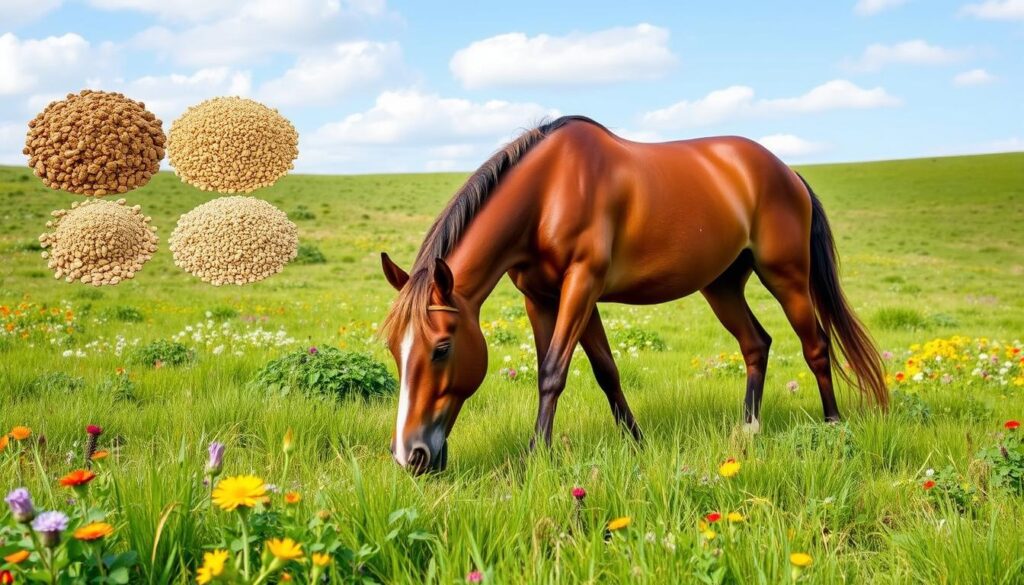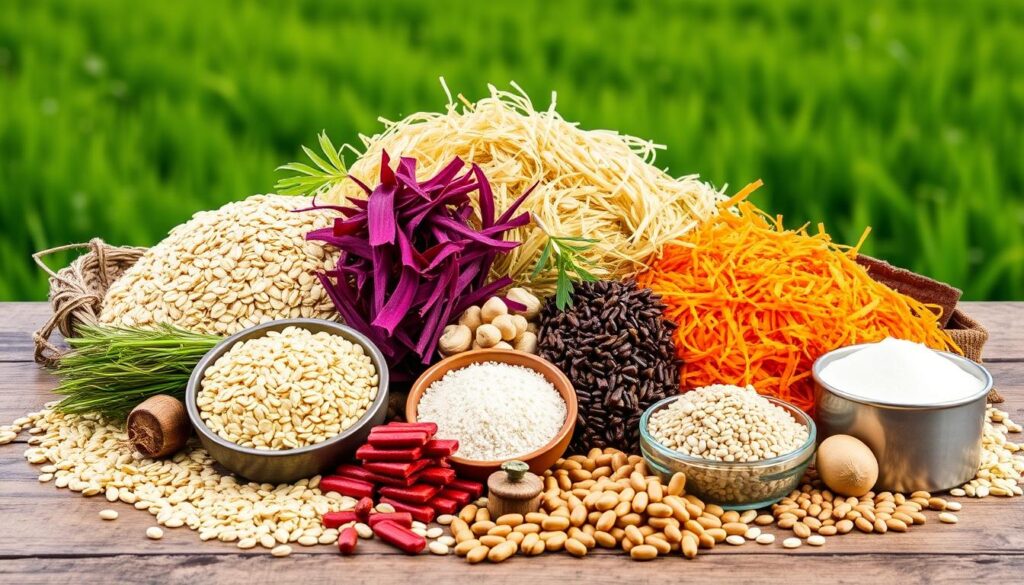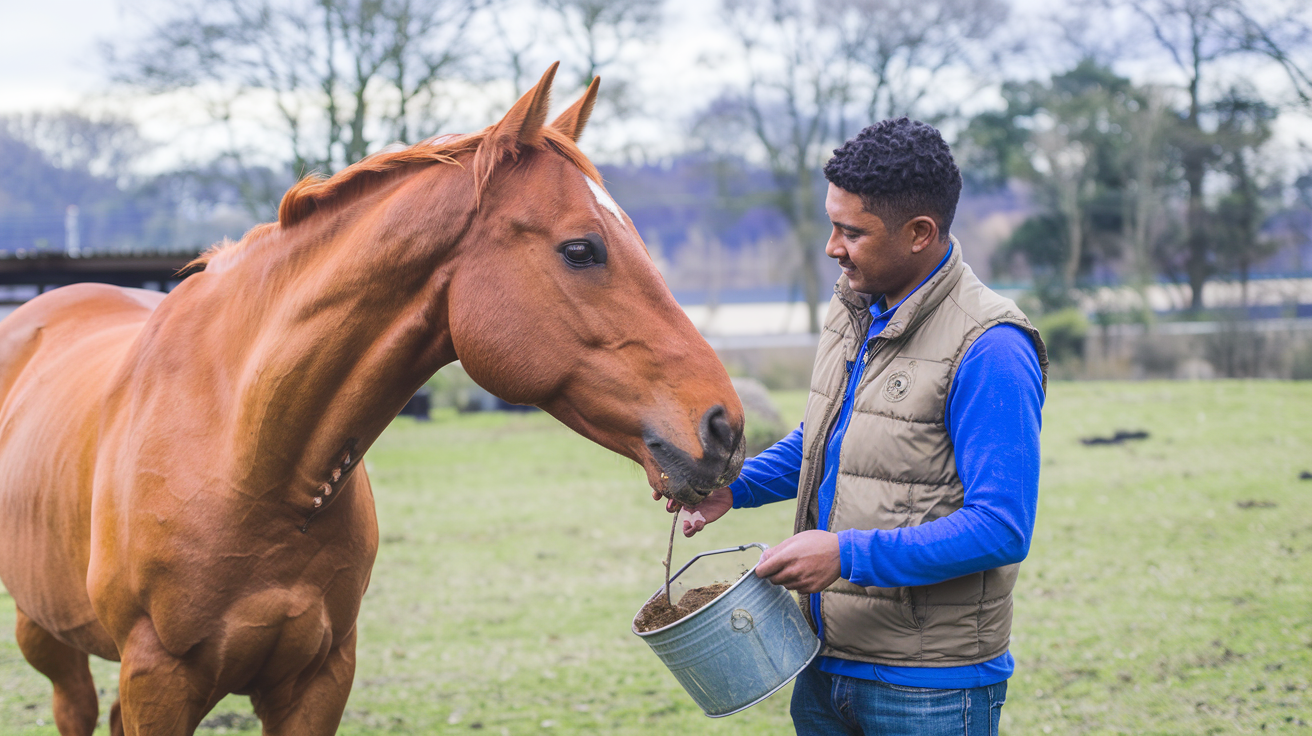Proper horse nutrition is key for your horse’s health and happiness. A balanced diet can improve your horse’s performance and life quality. In this article, we’ll explore important horse nutrition tips. You’ll get expert advice to help your horse thrive.
Knowing about proper nutrition helps you make better diet choices for your horse. This can lead to a happier, healthier horse. With the right tips, you can avoid health problems and support your horse’s well-being. This article is for both new and experienced horse owners, offering the knowledge to improve your horse’s nutrition.
Key Takeaways
- Proper horse nutrition is crucial for maintaining overall health and well-being
- A well-balanced equine diet recommendations can impact performance and longevity
- Understanding horse nutrition and diet tips can help prevent common health issues
- Expert-approved tips and recommendations can support your horse’s overall well-being
- Horse nutrition and diet tips can vary depending on factors such as age, breed, and level of activity
- Consulting with a veterinarian or equine nutritionist can help you make informed decisions about your horse’s diet
Understanding Basic Horse Nutrition and Diet Tips
Proper nutrition is key for a horse’s health and happiness. A balanced diet gives them essential nutrients for horses like water, protein, and vitamins. Experts at Park City Equine Center say a good diet keeps their digestive system healthy.
A healthy horse diet includes foods like high-quality hay and grains. It also has vegetables. The main parts of a healthy diet are:
- Carbohydrates: found in hay, grains, and plants
- Proteins: help build and fix tissues
- Fats: give energy and help absorb vitamins
- Vitamins and minerals: keep the body working right
By giving horses a balanced diet, owners help them stay healthy. A well-fed horse has a strong immune system. It also grows well and performs better.
Essential Nutrients Your Horse Needs Daily
It’s vital to give your horse the right nutrients for their health. A balanced diet with proteins, carbs, fats, vitamins, and minerals is key. The amount needed depends on their age, weight, activity, and health.
High-quality proteins like alfalfa and soybean meal are important. Complex carbs, such as fiber and starch, are also crucial. Fats, especially omega-3 and omega-6, keep their skin and coat healthy. Horses also need vitamins and minerals like vitamin E, calcium, and phosphorus for immune function and bone health.
For the best diet, consult an equine nutritionist or vet. They’ll create a diet plan tailored to your horse’s needs. This ensures they get the nutrients they need for a healthy life.
Key nutrients for horses include:
- High-quality protein sources, such as alfalfa and soybean meal
- Complex carbohydrates, like fiber and starch
- Fats, like omega-3 and omega-6 fatty acids
- Vitamins and minerals, including vitamin E, calcium, and phosphorus
The Role of Fiber in Your Horse’s Diet
Fiber is key for horse digestive health. It’s important to know the different types of fiber. A horse needs high-quality fiber sources like hay, pasture grass, and fiber supplements for good health. For more info on animal nutrition, check out online resources.
When feeding horses, it’s crucial to give them the right amount of fiber. This depends on their age and how active they are. Here are some important points:
- High-quality hay should be the main fiber source in a horse’s diet.
- Pasture grass is also great for fiber and nutrients. But, make sure the pasture is clean and weed-free.
- Fiber supplements can help if a horse can’t get enough good hay or grass.
Not enough fiber can lead to problems like colic and diarrhea. It can also cause weight loss and poor health. Keep an eye on your horse’s health and adjust their diet as needed. By following best feeding practices for horses and using quality fiber sources, you can help your horse stay healthy and happy.
Protein Requirements for Different Horse Types
Protein is key for essential nutrients for horses. It helps with muscle growth, tissue repair, and health. The amount of protein needed changes based on the horse’s age, activity level, and type. For example, growing foals and pregnant mares need more protein for their fast growth.
When picking the right equine diet recommendations, consider a few things:
- Life stage: Foals, yearlings, and pregnant mares need more protein than adult horses.
- Activity level: Horses that are active need more protein to build and repair muscles.
- Breed and size: Bigger breeds might need more protein because of their size and muscle.
To make sure your horse gets enough protein, talk to an equine nutritionist. They can help you find the best equine diet recommendations for your horse. They’ll create a diet plan with essential nutrients for horses, like protein, to keep your horse healthy and performing well.
Balancing Minerals and Vitamins in Equine Diets
A balanced diet is key for a horse’s health and performance. Important minerals like calcium, phosphorus, and selenium are crucial. They must be in the right balance for optimal nutrition.
Vitamins are also vital, but too much can be harmful. Vitamins E and D support the immune system and bones. Always consult a vet or nutritionist to ensure the right amount of vitamins for your horse.

Nutrient deficiencies can be hard to spot but are serious. Signs include poor coat, weak hooves, and low energy. Recognizing these signs helps prevent deficiencies and ensures your horse gets the nutrients it needs.
Essential Minerals for Horse Health
- Calcium: essential for bone health and development
- Phosphorus: crucial for energy production and nerve function
- Selenium: acts as an antioxidant to protect against cell damage
Providing a balanced diet with these minerals and vitamins supports your horse’s health. A well-balanced diet is essential for a horse’s well-being. Work with a vet or nutritionist to create a diet plan tailored to your horse’s needs.
Creating an Optimal Horse Feeding Schedule
Creating a good horse feeding schedule is key to your horse’s health. An optimal horse feeding schedule should match the horse’s digestive needs. It should also consider the number of meals and when to feed. Work routines, turnout times, and the horse’s individual needs are also important.
To help your horse’s digestion, follow these tips:
- Split your horse’s food into 2-3 meals to mimic grazing
- Make high-quality forage, like hay or pasture, the main food
- Change the feeding schedule based on your horse’s work and needs
Creating a good feeding schedule is hard, but it’s doable with planning. By following these guidelines and using best feeding practices for horses, you can improve your horse’s health. This includes better digestion and overall well-being.
Here’s a sample feeding schedule:
| Meal Time | Food Type | Quantity |
|---|---|---|
| 8:00 am | Hay | 2 flakes |
| 12:00 pm | Grain | 1 cup |
| 4:00 pm | Hay | 2 flakes |
Hydration Needs and Water Quality
Keeping horses hydrated is key to their health and weight. They need clean, fresh water always. The amount of water a horse needs depends on its size, how active it is, and the weather.
A horse should drink at least 10-12 gallons of water each day. But, this can go up to 20-25 gallons if they’re very active or it’s very hot. It’s important to watch how much water a horse drinks to make sure they stay hydrated.
Daily Water Requirements
Here are some guidelines for daily water requirements for horses:
- Small horses (less than 900 pounds): 8-10 gallons per day
- Medium horses (900-1200 pounds): 10-12 gallons per day
- Large horses (1200-1500 pounds): 12-15 gallons per day
- Very large horses (over 1500 pounds): 15-20 gallons per day
Monitoring Water Intake
It’s important to keep an eye on how much water a horse drinks. You can do this by checking the water level often. Also, watch how the horse acts and their overall health.
Pasture Management for Nutritional Success
Effective pasture management is key for a horse’s diet. It gives them the nutrients they need and keeps them healthy. Knowing the nutritional value of different grasses and legumes is important. A well-managed pasture can provide a balanced diet for horses.
Experts say rotational grazing is a good way to keep pastures healthy. This means dividing the pasture into smaller parts and moving horses around. It prevents overgrazing. Also, taking care of the soil and controlling weeds is important for quality pastures. This way, horses get the nutrients they need to thrive. For more info, check out pasture management resources.
Some important things to consider in pasture management are:
- Providing enough space for grazing
- Keeping a balanced diet with grasses and legumes
- Checking pasture quality and adjusting as needed
By following these tips and using best feeding practices for horses, owners can ensure their horses stay healthy. This is crucial for their overall well-being.
Seasonal Adjustments to Your Horse’s Diet
As the seasons change, it’s key to adjust your horse’s diet. This ensures they get the right nutrients for health. Horse nutrition tips are vital for your horse’s well-being. Equine diet recommendations change with the seasons, and knowing these changes is important for horse owners.
In winter, horses need more calories to stay warm. You can increase their energy with more hay and grains. In summer, they must stay hydrated, and keeping their electrolytes balanced is crucial to avoid dehydration. When seasons change, making diet changes slowly is important to avoid stomach problems.
Winter Feeding Strategies
Some key considerations for winter feeding include:
- Increase calorie intake through grains and hay
- Provide access to fresh water at all times
- Consider adding a warm water source to encourage drinking
Summer Nutrition Requirements
During the summer, focus on:
- Electrolyte balance through supplements or electrolyte-rich feeds
- Ensuring adequate hydration through access to fresh water
- Providing shade and ventilation to reduce heat stress
Transitional Period Adjustments
When transitioning between seasons, it’s essential to:
| Season | Dietary Adjustments |
|---|---|
| Winter to Spring | Gradually increase fresh grass and decrease hay |
| Spring to Summer | Introduce electrolyte supplements and increase water intake |
| Summer to Fall | Decrease electrolyte supplements and introduce more hay |
| Fall to Winter | Increase calorie intake through grains and hay |
By following these seasonal adjustments and considering horse nutrition and diet tips, you can help ensure your horse receives the necessary nutrients for optimal health and well-being. Equine diet recommendations should always be tailored to the individual horse’s needs and the specific season.
Special Dietary Considerations for Performance Horses
Performance horses need special nutrients to excel in their sports. A good diet is key to their success. It should have the right mix of carbs, fats, and proteins.
Electrolyte balance and staying hydrated are vital. Horses lose a lot of water and electrolytes through sweat. This can hurt their performance if not replaced.
Here are some important diet points for performance horses:
- More energy for their athletic needs
- More protein for muscle health
- Enough electrolytes to stay hydrated
- Always have fresh water available
By giving them the right nutrients, horses can perform better. This keeps them healthy and happy.

Remember, every horse is unique. Their diet needs change based on age, breed, and competition level. So, it’s best to get a diet plan from a qualified equine nutritionist.
| Dietary Component | Recommendation |
|---|---|
| Energy | Increased energy requirements to support athletic performance |
| Protein | Higher protein intake to support muscle growth and repair |
| Electrolytes | Adequate electrolyte balance to maintain hydration levels |
| Water | Access to plenty of fresh water to prevent dehydration |
Managing Weight and Body Condition
Keeping a horse at the right weight is key for their health. Good nutrition and diet tips are essential. A horse’s weight affects their performance, health, and happiness.
It’s important to check a horse’s weight and body condition often. You can use a body condition scoring system. This scores the horse from 1 (very thin) to 9 (very fat).
Body Condition Scoring
The body condition scoring system helps manage a horse’s weight. It shows where a horse might need to gain or lose weight. This tool helps owners make better diet choices for their horses.
Weight Management Strategies
Managing a horse’s weight involves diet and exercise. For gaining weight, high-calorie foods and supplements are good. For losing weight, eat less and exercise more.
Dietary Adjustments for Weight Control
Changing a horse’s diet is key for weight control. Good nutrition tips help owners make smart diet choices. Some tips include:
- Providing high-quality hay and grains
- Adding supplements as needed
- Ensuring fresh water always
- Limiting treats and snacks
By following these tips and using a body condition scoring system, owners can help their horses stay in good shape. Keeping a horse at the right weight is a continuous effort. It requires regular checks and adjustments to their diet and exercise.
| Body Condition Score | Description |
|---|---|
| 1-3 | Underweight |
| 4-6 | Ideal |
| 7-9 | Overweight |
Common Feeding Mistakes to Avoid
Many horse owners make mistakes in feeding their horses. These mistakes can harm their horse’s health. Overfeeding or underfeeding can cause digestive issues and other problems. It’s key to give the right amount of nutrients and avoid sudden diet changes.
Some common feeding mistakes to avoid include:
- Overfeeding or underfeeding
- Improper feed storage
- Sudden diet changes
- Not providing enough fresh water
By knowing these mistakes, horse owners can prevent them. This ensures their horses get the best care. It’s important to follow best feeding practices for horses and check their horse digestive health often.
Every horse is unique, and what works for one may not work for another. Working with a vet or equine nutritionist helps create a feeding plan. This plan meets the horse’s specific needs and promotes good horse digestive health.
| Feeding Mistake | Potential Consequence |
|---|---|
| Overfeeding | Obesity, digestive issues |
| Underfeeding | Malnutrition, weight loss |
| Improper feed storage | Moldy or spoiled feed, digestive issues |
Supplements and Their Role in Horse Nutrition
Providing essential nutrients for horses is key. A balanced diet is crucial. Sometimes, supplements are needed to ensure your horse gets all the nutrients. They help fill gaps in a horse’s diet, especially if regular feed lacks essential nutrients.
Supplements can support a horse’s health and well-being. For example, joint supplements reduce inflammation and improve mobility. Digestive aids support a healthy gut. Remember, supplements should complement a balanced diet, not replace it.
When choosing supplements, consider these points:
- Consult with a vet or equine nutritionist to find the right supplements for your horse.
- Choose high-quality supplements from trusted manufacturers.
- Don’t over-supplement, as it can upset the balance of essential nutrients.
By adding supplements to a balanced diet, you ensure your horse gets all the nutrients they need. A balanced diet and targeted supplements support your horse’s health and well-being.
Keep an eye on how your horse reacts to supplements and adjust their diet as needed. With the right diet and supplements, your horse can thrive.
| Supplement Type | Purpose |
|---|---|
| Joint Supplements | Support joint health and mobility |
| Digestive Aids | Support a healthy gut and digestion |
| Vitamin and Mineral Supplements | Fill nutritional gaps in a horse’s diet |
Health Issues Related to Poor Nutrition
Horse digestive health is key to their overall well-being. A balanced diet is essential for keeping them healthy. Poor nutrition can cause colic, laminitis, and metabolic disorders. It’s important to spot these problems early to prevent them from getting worse.
Some common health issues related to poor nutrition include:
- Colic: Abdominal pain caused by digestive problems
- Laminitis: Inflammation of the tissues connecting the hoof to the bone
- Metabolic disorders: Conditions such as equine metabolic syndrome and insulin resistance
Proper horse nutrition and diet tips can prevent these issues. A diet rich in fiber, protein, and vitamins is crucial. By following these horse nutrition and diet tips, horse owners can keep their horses healthy and thriving.
Regular health checks, including the digestive system, are vital. Working with a vet and following a balanced diet plan can prevent nutrition-related health issues. This way, horse owners can ensure their horses stay happy and healthy.
Senior Horse Dietary Requirements
As horses get older, their diet needs change. Senior horses need equine diet recommendations that focus on their health. A balanced diet is key to keeping them healthy and happy.
Important things to consider for senior horse diets include:
- Easily digestible proteins to support muscle health
- Certain vitamins and minerals, such as vitamin C and calcium, to support immune function and bone health
- Adequate fiber intake to support digestive health
Senior horses may face issues like dental problems or trouble digesting food. To help, you can:
- Offer soft, easy-to-chew foods
- Split meals into smaller, more frequent feedings
- Add supplements to aid digestion
By following these equine diet recommendations and ensuring they get the right nutrients, owners can help their senior horses stay healthy. This way, they can enjoy their golden years to the fullest.
Proper nutrition is essential for senior horses, and with the right diet and care, they can thrive and enjoy their golden years.
Conclusion: Implementing a Successful Nutrition Program
Caring for your horse’s nutrition is key to their health and happiness. This guide offers expert tips to help you give your horse the right food. It’s all about making sure they get a diet that fits their needs.
A good feeding plan includes the right mix of food and a schedule that works. It’s also important to watch your horse’s health and work with nutrition experts. Making changes to their diet as needed is crucial.
By focusing on the best ways to feed your horse, you can help them thrive. This means better health, more energy, and a longer life. Start this journey to see how it changes your horse for the better.

